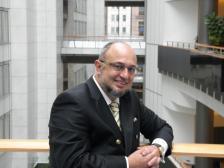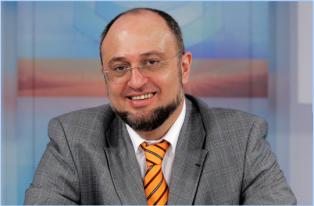News
Interview of Emil Stoyanov for CEETV

CEETV’s Yako Molhov met in Brussels with Emil Stoyanov, Member of the Commission on Culture, Education and Media at the European Parliament. The two talked about EU’s role in regulating and stimulating the development of media, digitalization and creation of content.
ceetv: Mr. Stoyanov, you are a member of the Commission on Culture, Education and Media at the European Parliament. The name of the Commission suggests a large scope of activities, can you tell us what are your activities in the media area?
In the past year we have worked on two reports in the media sphere, both of them prepared on our own initiative. The first one was done by Morten Løkkegaard and focused on journalism and new media and the creation of the public sphere in Europe. The second one was prepared by Ivo Belet and dealt with the future of the double system in the digital technologies era. I made numerous suggestions and amendments into the two reports and most of them were accepted by the Commission.
ceetv: One of the hottest and most current topics in the world of TV, not only in CEE but also in the EU as a whole is digitalization…
Digitalization is just a new way of distributing TV programs, i.e. a new TV technology. It will happen no matter what the decisions of the Commission, the European Parliament or the national broadcasting authorities are. It doesn’t particularly concern European citizens if this happens sooner or later. For me much more important is what type of programs will air on European TV screens because this is the main question which affects millions of viewers in all age categories.
ceetv: What is the role of your Commission in this respect, do you follow the transition from analog to digital TV and radio broadcasting closely? What are your duties and responsibilities in this process? Is there a delay in any of the countries?
Media regulation is not amongst the priorities of the EU institutions and this question, for good or bad, is left up to local national legislation. There are, of course, numerous common requirements but they are very cautious and are more discretionary than mandatory to member states.
ceetv: Despite some common framework, each of the EU member states has its own media legislation which often varies from country to country. Which are the problematic areas in the legislations of the member states as well as in the candidate countries? What is the Commission’s opinion regarding public broadcasters in member countries in CEE? In which countries they fulfill their obligations well?
Public broadcasters in member states are looked at with special attention because they are regarded for being independent and a corrective of power. Much different is the situation in the countries which were part of the former communist rule where, based on the past, public media are not a corrective but a continuation of power.
My personal opinion on this is that there should be fair conditions about the development of both public and private media. This means that taxpayers' money should not be automatically poured into public media but must be put into separate funds so that all media can apply for this public money. An example: if a decision to build a highway is taken, a public tender is announced in which both private and state companies can take part. And the one who’s the best wins. This way all public money can be distributed, be it for media, education, highways.
ceetv: How does the European Parliament encourage the creation of interesting and attractive content for TV viewers and Internet users?
TV and the Internet have become interconnected vessels. I believe that in the next 20 years this will be the dominant media symbiosis which will attract the highest percentage of viewers and, respectively, advertisers. TV regulation will be kept in some way but on the territory of the Internet it will be virtually impossible because of its amazing technological development. But if we consider this again being a technological process, much more important is the content of TV and its creative development.
It is of great importance not to put limits but stimuli for media to be found which create content which corresponds to the good taste and good manners. If you ask me what these stimuli must be, I will bring you back to the previous question about the financing of public media and will answer that it is nonsense to finance a certain medium with public money, be it a public one, instead of having public interest-skewed programs on all media.
More News:
» 22/06/2012 | 18:57 News - Digital Agenda Assembly
» 18/06/2012 | 17:01 News - Throughout November – New National strategy for Bulgarians, who live abroad
» 18/06/2012 | 11:13 News - Emil Stoyanov's interview for '24 hours' newspaper: It is important not to brag against the country, but to work for solutions.
» 06/06/2012 | 14:15 News - The Committee on Culture of the European Parliament in Plovdiv
» 05/06/2012 | 16:00 News - Bulgarians abroad: The Bulgarian Vice-President Margarita Popova and Emil Stoyanov аre organizing a meeting of the Bulgarian communities abroad.
» 29/02/2012 | 23:24 News - Bulgarian Horo danced in the European Parliament
» 12/07/2011 | 13:36 News - EP Today published the article by Emil Stoyanov: The Battle for Schengen. More Europe or less Europe in this decade
» 23/03/2011 | 14:26 News - Emil Stoyanov's efforts for a Pan-European education - crowned with success
» 03/03/2011 | 13:42 News - "The East and the West, as seen from Bulgaria" an article by Emil Stoyanov published by eureporter in February 2011
» 09/07/2010 | 17:40 News - Parlamentary session 5-8th July 2010



